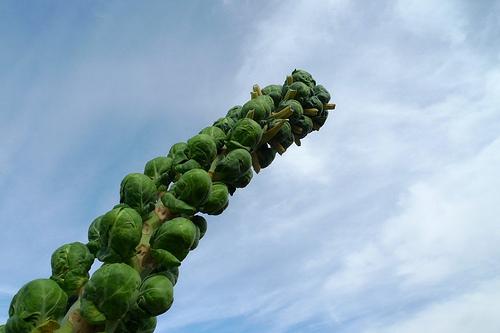
« PREVIOUS ENTRY
Please please please somebody bring this concept to market

Is it ethical to eat plants? The argument against using animals for food has been gaining a lot of ground these days; veganism is becoming way more prominent, and there have been several bestselling books making the case against eating meat. But a few months ago I started wondering about about plants, and whether the logic could be extended to them.
The idea seems absurd on the surface. Anti-meat advocates point out that animals are conscious, have agency, and often have astonishingly high levels of awareness, intelligence and society. (Grey parrots and pigs are extremely smart; octopuses are almost alarmingly so.) But surely the same can’t be said of plants, can it?
Apparently it can. In a recent story in the New York Times, Natalie Angier — a science writer and (self-admittedly) irregular vegetarian — makes the case that plants “no more aspire to being stir-fried in a wok than a hog aspires to being peppercorn-studded in my Christmas clay pot … Plants are lively and seek to keep it that way.”
The most fascinating part for me was Angier’s description of the way plants recognize they’re being eaten, and fight back by calling for help:
Just because we humans can’t hear them doesn’t mean plants don’t howl. Some of the compounds that plants generate in response to insect mastication — their feedback, you might say — are volatile chemicals that serve as cries for help. Such airborne alarm calls have been shown to attract both large predatory insects like dragon flies, which delight in caterpillar meat, and tiny parasitic insects, which can infect a caterpillar and destroy it from within. [snip]… certain plants can sense when insect eggs have been deposited on their leaves and will act immediately to rid themselves of the incubating menace. They may sprout carpets of tumorlike neoplasms to knock the eggs off, or secrete ovicides to kill them, or sound the S O S. Reporting in The Proceedings of the National Academy of Sciences, Dr. Hilker and her coworkers determined that when a female cabbage butterfly lays her eggs on a brussels sprout plant and attaches her treasures to the leaves with tiny dabs of glue, the vigilant vegetable detects the presence of a simple additive in the glue, benzyl cyanide. Cued by the additive, the plant swiftly alters the chemistry of its leaf surface to beckon female parasitic wasps. Spying the anchored bounty, the female wasps in turn inject their eggs inside, the gestating wasps feed on the gestating butterflies, and the plant’s problem is solved.
You could counterargue, of course, that the plants aren’t actually conscious or self-aware. But you could make the same argument about some animals. And of course, we have legal arguments all the time about the pulling the plug on mentally incapacitated humans. (Granted, we’re not pulling the plug on them for the purposes of farming and eating them, but some of the philosphical nut is there.) The point is, we’ve always drawn a very clear line between animals and plants; Angier thinks it ought to be much blurrier.
The funny thing is, in practice we do have many situations where people ascribe a lot of agency to plants, and get enormously upset when those plants come to harm. Trees are a good example: There are laws in many townships prohibiting you from cutting down older trees, and I’ve seen people weep when a favorite tree is felled by a storm. You can’t judge the moral status of a being based merely on whether its demise upsets somebody — but the emotions stirred here are interesting and suggestive, to say the least.
By the way, the comment thread for Angier’s article is sprawling and super interesting too.
(The picture of the brussels-sprout plant above is courtesy arnold | inuyaki’s Creative-Commons-licensed Flickr photostream!)
I'm Clive Thompson, the author of Smarter Than You Think: How Technology is Changing Our Minds for the Better (Penguin Press). You can order the book now at Amazon, Barnes and Noble, Powells, Indiebound, or through your local bookstore! I'm also a contributing writer for the New York Times Magazine and a columnist for Wired magazine. Email is here or ping me via the antiquated form of AOL IM (pomeranian99).

ECHO
Erik Weissengruber
Vespaboy
Terri Senft
Tom Igoe
El Rey Del Art
Morgan Noel
Maura Johnston
Cori Eckert
Heather Gold
Andrew Hearst
Chris Allbritton
Bret Dawson
Michele Tepper
Sharyn November
Gail Jaitin
Barnaby Marshall
Frankly, I'd Rather Not
The Shifted Librarian
Ryan Bigge
Nick Denton
Howard Sherman's Nuggets
Serial Deviant
Ellen McDermott
Jeff Liu
Marc Kelsey
Chris Shieh
Iron Monkey
Diversions
Rob Toole
Donut Rock City
Ross Judson
Idle Words
J-Walk Blog
The Antic Muse
Tribblescape
Little Things
Jeff Heer
Abstract Dynamics
Snark Market
Plastic Bag
Sensory Impact
Incoming Signals
MemeFirst
MemoryCard
Majikthise
Ludonauts
Boing Boing
Slashdot
Atrios
Smart Mobs
Plastic
Ludology.org
The Feature
Gizmodo
game girl
Mindjack
Techdirt Wireless News
Corante Gaming blog
Corante Social Software blog
ECHO
SciTech Daily
Arts and Letters Daily
Textually.org
BlogPulse
Robots.net
Alan Reiter's Wireless Data Weblog
Brad DeLong
Viral Marketing Blog
Gameblogs
Slashdot Games